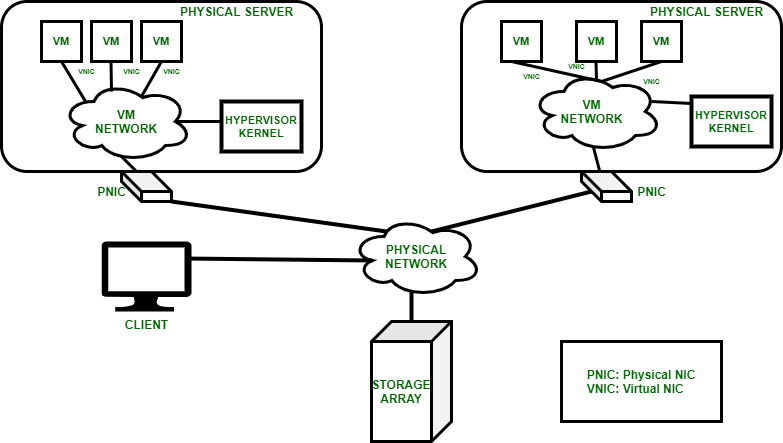Network virtualization is the process of abstracting network resources from the underlying hardware. This allows for the creation of virtual networks that can be dynamically provisioned and managed. Network virtualization can be used to improve the agility, flexibility, and security of networks.
There are many different use cases for network virtualization, but some of the most common include:
- Data center virtualization: Network virtualization can be used to create virtual networks within a data center. This allows for the isolation of different workloads and the efficient use of network resources.
- Wide area network (WAN) virtualization: Network virtualization can be used to create virtual WANs. This allows for the aggregation of multiple WAN links and the creation of a single, logical network.
- Cloud computing: Network virtualization is a key technology for cloud computing. It allows for the creation of virtual networks that can be dynamically provisioned and managed.
- Edge computing: Network virtualization is also being used for edge computing. This is a new computing paradigm that brings compute and storage resources closer to the end user.
Network virtualization can be most effective in situations where the following conditions are met:
- There is a need for agility and flexibility: Network virtualization can help organizations to quickly and easily provision new networks and to respond to changes in demand.
- There is a need to improve security: Network virtualization can help to improve network security by isolating different workloads and by providing a single point of management for security policies.
- There is a need to reduce costs: Network virtualization can help to reduce costs by consolidating network infrastructure and by optimizing the use of network resources.
In addition to these general conditions, there are also some specific use cases where network virtualization can be particularly effective. For example, network virtualization can be very effective for:
- Creating isolated networks for different workloads: This can help to improve security and compliance.
- Aggregating multiple WAN links: This can improve performance and reliability.
- Creating virtual WANs: This can help to reduce costs and improve agility.
- Deploying cloud computing applications: This can help to improve performance and scalability.
- Enabling edge computing: This can help to improve performance and latency.
Overall, network virtualization is a powerful technology that can be used to improve the agility, flexibility, security, and cost-effectiveness of networks. It is a valuable tool for organizations that are looking to modernize their networks and to meet the challenges of the digital age.
Here are some additional benefits of network virtualization:
- Improved performance: Network virtualization can help to improve network performance by reducing latency and improving throughput. This is because virtual networks can be optimized for specific applications or workloads.
- Increased scalability: Network virtualization can help to increase network scalability by allowing for the easy addition of new capacity. This is because virtual networks are not tied to the physical infrastructure.
- Simplified management: Network virtualization can help to simplify network management by centralizing the control of network resources. This makes it easier to manage and troubleshoot networks.
If you are considering network virtualization, there are a few things you should keep in mind:
- The right solution: There are many different network virtualization solutions available, so it is important to choose the right one for your needs.
- The right implementation: Network virtualization can be complex to implement, so it is important to have a well-defined plan.
- The right training: Network virtualization requires new skills and knowledge, so it is important to train your staff.
Overall, network virtualization is a powerful technology that can be used to improve the agility, flexibility, security, and cost-effectiveness of networks. If you are looking to modernize your networks, network virtualization is a good option to consider.thumb_upthumb_downuploadGoogle itmore_vert





